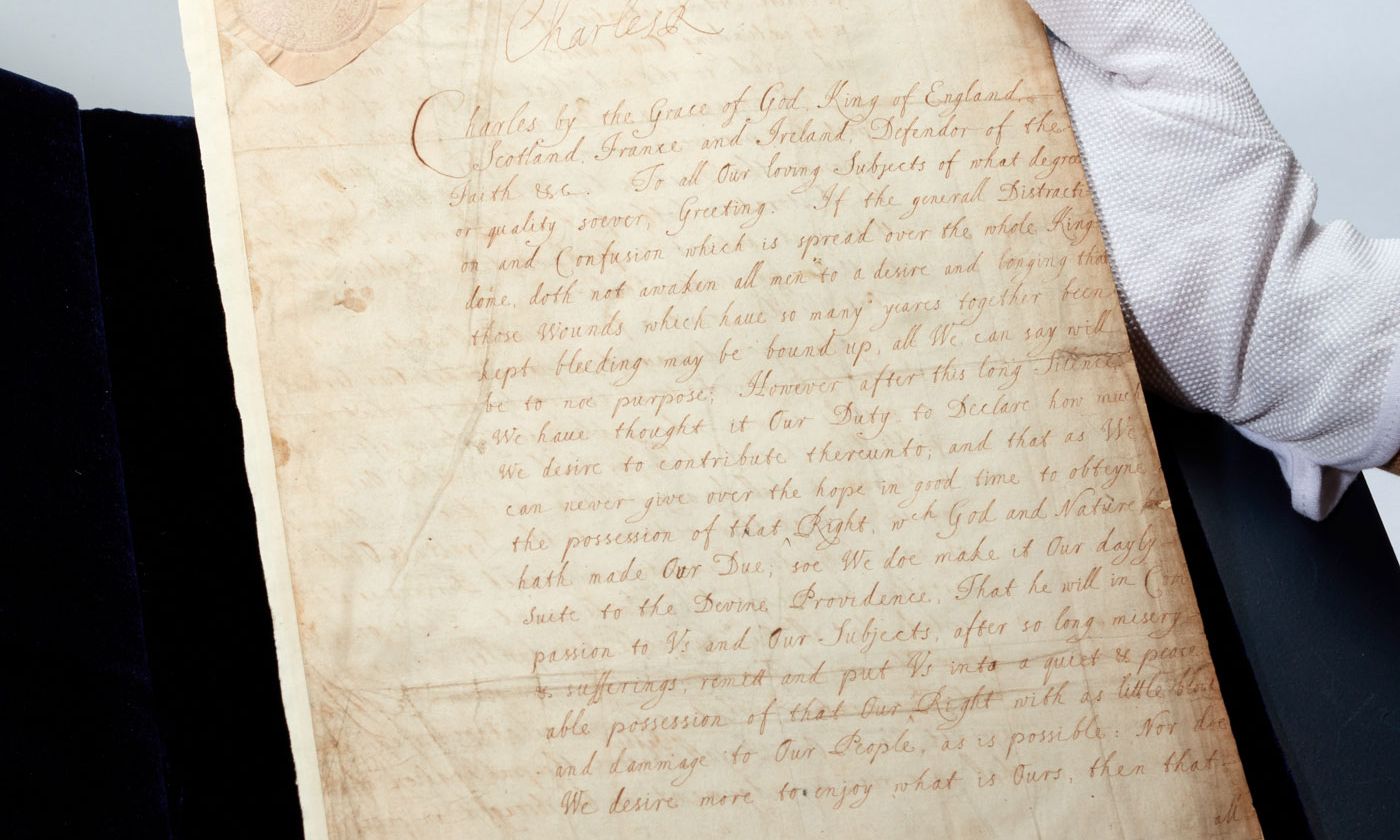One of only two surviving signed copies of The Declaration of Breda, in which King Charles II set out his terms for the Restoration of the British monarchy in 1660, is on offer with an estimate of £400,000-£600,000 Courtesy Sotheby's
A coronation auction brings to mind a glut of Royal memorabilia, stuffed to the gunnels with pairs of Queen Victoria’s underpants and commemorative mugs.
But Sotheby’s The Coronation Sale, a cross-category online auction (until 4 May) marking the run up to King Charles III’s coronation, is a more highbrow affair centred on manuscripts with connections to the British royal family.
Its starting point and centrepiece is The Declaration of Breda, the document that marks the restoration of the monarchy in 1660, in which King Charles II (then exiled in Breda in the Netherlands) sets out his vision for his future kingship and the terms on which he will return home. Five copies were made—for the Navy, the House of Commons, the City of London, the Army, and the House of Lords. This one, made for the Navy, is one of only two surviving copies signed by King Charles II (the other is in the parliamentary archives) and was last sold by Sotheby’s in 1985, by the descendants of Edward Montagu, the man who brought Charles back to England. Adding to its appeal, this copy also physically passed through the hands of the diarist Samuel Pepys, then secretary to Montagu, who held the office of the General at Sea.
“Alongside the Magna Carta, The Bill of Rights and The Act of Settlement, this is one of a small number of transformational royal documents that have changed royal power forever, and as such it is the most important of its kind to ever appear for public sale,” says Gabriel Heaton, Sotheby’s manuscripts specialist. The document is estimated at £400,000-£600,000, and Heaton describes it as “a once in a generation opportunity to own a document that marks such a significant and dramatic moment of change and hope in British history…the message is all about reconciliation, overcoming the divisions and tumult of the previous decade. The language is really beautiful—Charles II knows how to play his cards right, and within weeks he is welcomed back into London on his 30th birthday.”
Letter from Katherine Parr announcing her marriage to Henry VIII (est. £15,000-£20,000) Courtesy Sotheby's
When Sotheby’s was approached by the owners of The Declaration of Breda about selling it, Heaton and his colleagues had the idea of putting together a coronation sale. “The sale has enabled us to trace a history of the British monarchy, mostly through the historic documents that form the backbone of the sale but also through the other items,” Heaton says, referring to the peppering of royal-related jewellery, watches, wine and art that sit alongside the manuscripts and letters.
The documents included “have significant royal content”, not just signatures, Heaton says. And so alongside the Declaration of Breda is a letter signed by Katherine Parr announcing her marriage to Henry VIII (£15,000-£20,000); a letter by Charles I on the brink of defeat in the Civil War (£7,000-£9,000); a manuscript recording claims to hereditary rights to offices and duties at the Coronation of Queen Mary I, many of which are still active today (£3,000-£5,000) and a series of letters by a young King Edward VIII.
A set of heraldic manuscripts bound in red velvet, presented as New Year’s gifts to Elizabeth I between 1569 and 1580 (est. £100,000-£200,000) Courtesy Sotheby's
Demand for royal manuscripts, Heaton says, skews towards the Tudors, something reflected in the estimates, and one of the most impressive documents is a group of nine illustrated heraldic manuscripts bound in red velvet which were presented as New Year’s gifts to Elizabeth I between 1569 and 1580 (est. £100,000-£200,000). “New Year was a lavish gift giving occasion in the Elizabethan court, and every year the chief herald would give a velvet-covered book of coats of arms, bound in red velvet which was Queen Elizabeth’s favourite binding—almost none survive in their original binding as it’s a relatively fragile binding,” Heaton says, adding: “Barely [any] original objects from the Elizabethan court survive”. The manuscripts were last sold by Sotheby’s in the early 1980s to the present owners.
A set of replica Crown Jewels, 1953 (est. £10,000-£15,000) Courtesy Sotheby's
Historical manuscripts, Heaton says, “is a very venerable collecting area and there are many established collectors, and we’ve certainly had a very good response from those collectors. But clearly the cross-category sale is also an opportunity to reach more widely [via the royal connection] and bring in new collectors.”
The more, perhaps, archetypal royal memorabilia on offer in the 36-lot sale includes a replica set of the Crown Jewels made for Queen Elizabeth II’s coronation in 1953 (est. £10,000-£15,000), or one of the six Garrard & Co diamond brooches given by Elizabeth II to her six maids of honour for their service at the event (est. £30,000-£50,000).
Bryan Organ, Study for Prince of Wales, 1980 (est. £3,000-£5,000) Courtesy Sotheby's
And bringing it up to date, there is a pencil study of King Charles III by Bryan Organ, done in 1980 as a preparatory sketch for the portrait that now hangs in London’s National Portrait Gallery (est. £3,000-£5,000), alongside a case of 2004 Mouton Rothschild with a label based on a watercolour by King Charles (est. £3,800-£5,000).
The auction is on view at Sotheby’s New Bond Street saleroom in London until 4 May.

